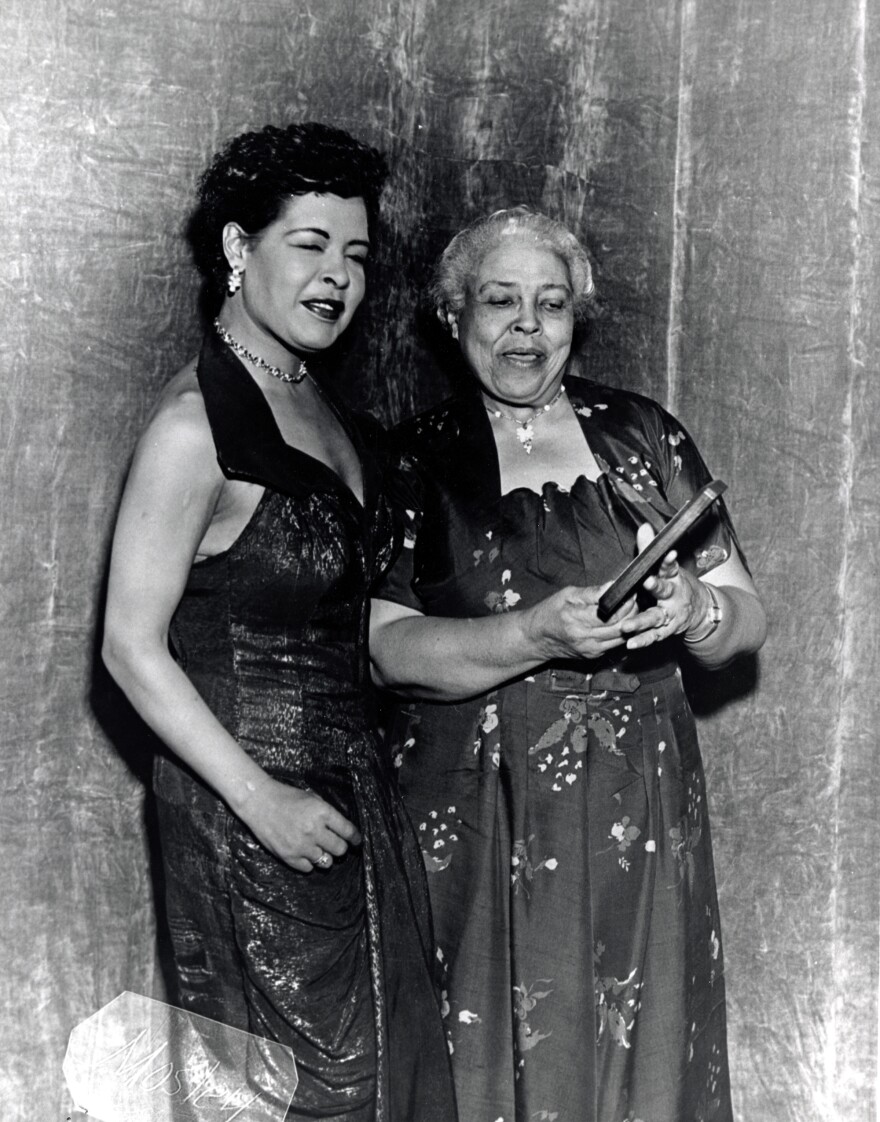Jazz has featured women contributors from its inception. Yet beyond vocalists, female composers and instrumentalists are disturbingly underrepresented across the genre. However, as society evolves, outdated stereotypes are being challenged as more women in music take leadership roles—both on and off the stage.

For Women's History Month, we asked women on the Philadelphia jazz scene about the women role models who mentored them and how they are now paying it forward.
"I learned from some of the greatest musicians in the world," reflected vocalist Joanna Pascale, a member of the vocal faculty at both Temple University and the University of Pennsylvania.
"I have always loved the Great American Songbook from when I was a child; I studied Billie Holiday when I was 15. It wasn't enough that I just wanted to sing with them; I wanted to breathe with them. I wanted to really embody the spirit of the phrasing, and for as much as I did that with Billie Holiday, Sarah Vaughn, and Carmen McRae, it was Miss Justine who was just such a huge influence on me."
Legendary local vocalist Justine Keeys, aka Miss Justine, enthralled audiences at clubs and private venues across the Philadelphia area with the late pianist Gerald Price. In discussing her life in music in 2015 with WRTI's Meridee Duddleston, she said she drew on influences that included Ella Fitzgerald, Etta Jones, and Nancy Wilson.
"I think jazz is the feeling that you give to the music," Miss Justine said. "I do what I'd call classic jazz: you sing it the way it's written, and then you sing it the way you feel it. To me, that's what makes jazz."
Like Miss Justine, Pascale insists that she cannot perform a song unless she can connect personally with its lyrics.
"I used to drive her crazy, following her around to every gig she did,” laughed Pascale at the memory. “I would sit there and soak it up and try to learn her songs. She had such an identifiable Philadelphia sound—and if I can carry any of that with me, I'm happy the rest of my life."
One of the most visible and beloved members of the Philadelphia jazz community was the late Shirley Scott, hailed as the "Queen of the Organ." She recorded and performed as a pianist and became a mentor and instructor in her later years. During an oral history interview conducted with one of her students in 1998, Scott said, "Cheyney University gave me an opportunity to be around young people and to teach them about history that maybe I had been a part of and tell them what I know."
Now an NYU sophomore, saxophonist Olivia Hughart is the founder and artistic director of Key of She Jazz, an initiative created while she was in middle school to address girls and women players' inequity in the jazz community.
With support from two key women in her life—her mother, Amy Hughart, who serves as managing director of Key of She Jazz, and advisor Jenny L. Neff, an associate professor and University of the Arts' chair of Music Education—Hughart held the first Key of She Jazz conference for 200 attendees at UArts to celebrate and mentor fellow women in jazz.
"Our mission is to support and encourage girls as they become involved in jazz," said Hughart to WRTI.org earlier. "I think one of the biggest issues is that we need a better representation of women in jazz because girls need to see themselves and envision themselves having a successful future in jazz."

Several years ago, multi-instrumentalist, composer and musical storyteller Kendrah E. Butler-Watersteamed with Jazz Bridge President and Sistas in the Front Founder Rhenda Fearrington to develop the Women in Jazz Tour "to bring other women into the fold to perform and demonstrate that there are really awesome professional women who were doing some amazing things."
She recalled that "throughout the years, I would say that I encountered more women in terms of mentorship later in my musicianship, and it was more in terms of just good friendships and relationships amongst other female musicians. I had mostly chance encounters with female musicians in terms of mentorship, with most of my mentorship, ironically, coming from professional male musicians."
As Butler-Waters' casts an eye on the future (as evident on her recently released debut solo album, Faith Walk, she is firmly rooted in the past for her inspiration.
"I recently started exploring Florence Price (1887-1953) and Margaret Bonds (1913-1972), both female composers and pianists, and of course, Nina Simone, but Mary Lou Williams is probably the most integral part in terms of posthumous mentorship if you want to say."
Pianist, composer, and arranger Mary Lou Williams (1910-1981) produced a repertoire that spanned several seminal jazz styles. Considered the "First Lady of Jazz," she wrote jazz-inflected liturgical works for Roman Catholic masses and taught at Duke University, in her later years. Visually, she is most famous as one of three women (alongside Marian MacPartland and Maxine Sullivan) photographed in 1958 with over 50 other great jazz musicians for the iconic image, "A Great Day In Harlem."
Butler-Waters continued: "With studying her life, music, and works, [Williams] has a powerful story in terms of how she came through jazz and how in the last 25 years of her life sacred jazz was a large part of who she was. Her career started exploding after returning from Europe after she converted to Catholicism, and she single-handedly created the Jazz Vesper as we know it. So, she definitely had one of the largest impacts—and I never even knew the woman."
Women in jazz continue to challenge unconscious bias while embracing a collective experience that connects them through enriching mentoring relationships that span not only across generations but also lifetimes.
********

Women’s History Month on WRTI is supported by Temple University, which celebrates the legacy of Agnes Berry Montier, class of 1912, and the first Black woman to earn a medical degree from Temple.


